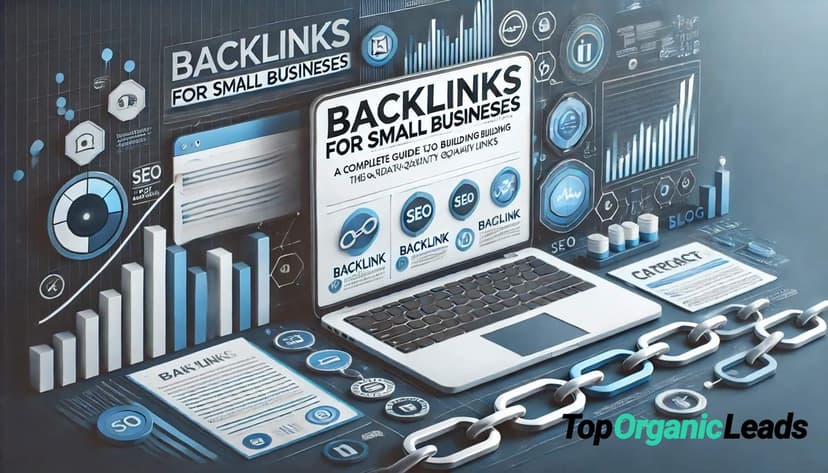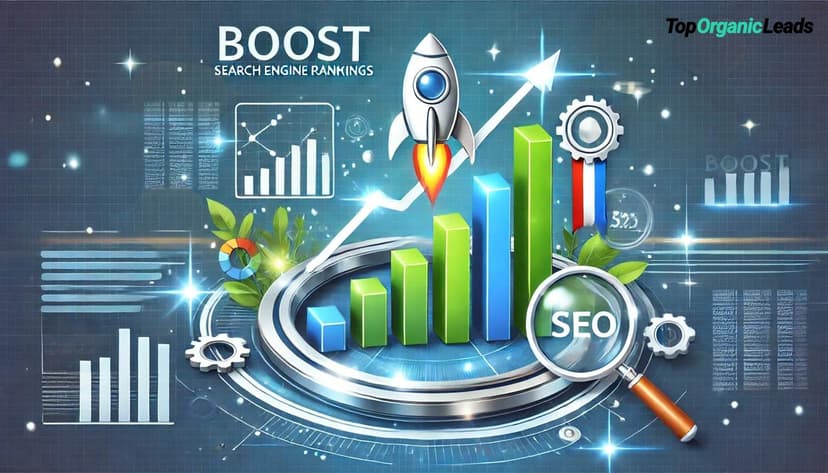In today’s competitive digital landscape, small businesses must leverage every possible advantage to stand out online. One of the most effective strategies for improving search engine rankings, boosting organic traffic, and strengthening brand authority is through high-quality backlinks.

This guide combines actionable strategies, modern link-building insights, and tools to help your small business earn authoritative backlinks in 2025.
What Are Backlinks Anyway?
Backlinks—also known as inbound links or external links—are hyperlinks from one website to another. When another website links to your small business website, it acts as a vote of confidence, signaling to search engines that your content is valuable, relevant, and authoritative.
Partner up with us to make new leads!
Call now to consult with our digital marketing experts.
Why Do Backlinks Matter?
Search engines like Google, Bing, and Yahoo use backlinks as ranking signals. Websites with more high-quality backlinks tend to rank higher in search engine results pages (SERPs) because backlinks indicate trust and credibility. Here are some benefits of backlinking: an elaborate description of how backlinks matter.
-
Authority & Trust: Search engines view backlinks as a vote of confidence. A backlink from a trusted, high-authority site tells Google that your content is valuable and credible.
-
Higher Rankings: Websites with strong backlink profiles tend to rank higher on SERPs, leading to more organic traffic.
-
Faster Indexing: Backlinks help search engine crawlers discover and index your pages quickly, making your website more visible online.
-
Referral Traffic: High-quality backlinks drive direct traffic from other websites, increasing your chances of converting visitors into leads or customers.
How Do Backlinks Work?
Imagine backlinks as referrals in the digital world:
- If a trusted industry blog links to your content, search engines view your site as credible and authoritative.
- If a low-quality or spammy site links to you, it could negatively impact your SEO.
Types of Backlinks: DoFollow vs. NoFollow
- DoFollow Backlinks: These links pass SEO value (link juice), helping improve your website’s rankings.
- NoFollow Backlinks: These links do not pass SEO value but can still drive referral traffic and brand visibility.
To succeed in small business SEO, it's essential to build high-quality DoFollow backlinks from reputable, relevant websites while avoiding spammy or low-authority sources.
Quality Over Quantity: The Key to SEO Success
Not all backlinks carry the same weight. High-quality backlinks from authoritative, industry-relevant websites significantly boost your SEO, while low-quality or spammy backlinks can harm your rankings.
A study by Ahrefs found that 91% of web pages get zero organic traffic because they have no backlinks!
To outrank competitors and boost search visibility, small businesses must focus on earning valuable, natural backlinks through ethical SEO practices.
Key Benefits of Backlinks for Small Businesses
Let's assume that you are already using backlinks on your website. How would it enhance your lead generation process?

Boost Search Engine Rankings
Search engines like Google and Bing consider backlinks as one of the top ranking factors. The more high-quality backlinks your website has, the higher it will rank in search engine results pages (SERPs), making it easier for potential customers to find you.
- Increasing Organic Traffic
- Enhancing Brand Credibility & Trust
- Faster Search Engine Indexing
- Strengthening Your Online Authority
- Outranking Competitors
How Can I Build a Backlink Strategy for My Website?
A well-planned backlink strategy is needed for boosting search rankings, increasing organic traffic, and strengthening your small business’s online presence. Instead of focusing on quantity, the key is to build high-quality backlinks from authoritative and relevant sources.
Step 1: Set Clear Backlink Goals
Before you start building backlinks, define your objectives:
- Improve search rankings for competitive keywords.
- Increase organic traffic from referral sources.
- Strengthen brand authority in your industry.
- Outrank competitors in local and national searches.
Having clear goals will help you prioritize your link-building efforts and focus on strategies that drive real results.
Step 2: Identify High-Quality Backlink Opportunities
Not all backlinks are valuable. Focus on securing links from authoritative, industry-relevant websites. To find potential linking opportunities, use SEO tools like Ahrefs, SEMrush, and Moz Link Explorer.
Look for backlink opportunities from:
- Industry blogs and publications
- Local business directories
- Trusted news websites
- Influencers and niche communities
Step 3: Create Valuable Content That Attracts Backlinks
One of the best ways to earn organic backlinks is by creating high-value, shareable content that other websites want to link to.
- In-depth guides & tutorials – Comprehensive resources that establish your expertise
- Infographics & data-driven reports – Visual content that attracts links from blogs and media outlets
- Case studies & original research – Unique insights that industry professionals reference
Step 4: Leverage Guest Blogging for Free Backlinks
Guest blogging is an effective way to secure high-quality backlinks while showcasing your expertise; here’s why:
- Find reputable blogs in your industry that accept guest contributions.
- Pitch valuable, well-researched topics relevant to their audience.
- Include a natural backlink to your website in the content or author bio.
Avoid spammy guest posting on low-quality or irrelevant websites, as it can harm your SEO.
Step 5: Use Broken Link Building to Gain Easy Backlinks
- Find broken links on high-authority websites in your niche using tools like Ahrefs or Broken Link Checker.
- Reach out to website owners and notify them of the broken link.
- Offer your content as a replacement, creating a win-win scenario.
This technique helps website owners fix dead links while giving your business a high-quality backlink.
Step 6: Track and Optimize Your Backlink Strategy
Monitor your backlink progress using:
- Google Search Console to track backlinks indexed by Google
- Ahrefs or SEMrush to analyze backlink quality and referral traffic
- Moz’s Spam Score to identify and disavow toxic backlinks
By continuously refining your backlink strategy, you’re building long-term authority, improving SEO rankings, and driving sustainable traffic to your small business website.
Effective Link-Building Techniques for Small Businesses
Here are the most effective white hat link-building strategies to use in 2025.
Social Media Engagement
Being active on social media platforms helps build brand awareness and increase backlink opportunities.
- Share high-quality blog content, infographics, and videos.
- Engage in industry-related discussions and groups.
- Collaborate with influencers who can mention and link to your website.
While most social media links are nofollow, they still drive brand exposure and organic backlinks.
Online Reviews and Testimonials

Encouraging customer reviews and testimonials on trusted platforms can enhance credibility and earn backlinks.
- Request satisfied customers to leave reviews on Google, Trustpilot, and industry-specific sites.
- Provide testimonials to vendors or business partners in exchange for backlinking them on your website.
- Feature client reviews on your website with schema markup to improve visibility.
Broken Link Building
This technique involves identifying broken external links on authoritative websites and offering your content as a replacement link.
- To find broken links, use tools like Ahrefs, Moz, or Broken Link Checker.
- Reach out to webmasters and inform them of the broken link and suggest your content as a replacement.
- Ensure your content matches or improves upon the original resource.
This is a win-win strategy that helps both website owners and your small business.
Building Relationships with Influencers
Networking with industry influencers, bloggers, and content creators can lead to organic link-building opportunities.
- Engage with influencers on social media and in industry discussions.
- Offer valuable insights, content, or collaboration opportunities.
- Establish relationships through partnerships, interviews, and co-branded content.
Influencer marketing combined with authentic relationship-building can lead to natural backlinks from authoritative sources.
HARO (Help a Reporter Out)
Using HARO enables small businesses to get featured in media publications and earn high-quality backlinks from news websites.
- Sign up for HARO and respond to journalist queries relevant to your industry.
- Provide expert insights, quotes, or data for articles.
- Get featured in reputable publications such as Forbes, Business Insider, and local news sites.
These earned backlinks enhance brand authority and search engine trust signals.
Common Backlinking Mistakes to Avoid
Acquiring high-quality backlinks isn’t easy and quick. It’s a process that only happens if you produce useful and valuable content consistently. So, trying to take a shortcut by gaming the system and settling for low-quality backlinks only harms your website. Look out for the following:
- Black Hat Link Building
- Producing low-quality content
- Ignoring internal link building
- Not disavowing problematic and toxic backlinks
- Increasing the number of backlinks, even if the websites are unrelated or low-quality
- Using only one or two link-building techniques
- Not adapting the strategies to new search algorithm updates
- Lack of consistency
- Lack of patience
What Tools Can I Use to Improve My Link Building Techniques?
Different tools come in handy when it comes to link building. Here are a few of the most useful ones:
Final Thoughts
Backlinks are a long-term investment in your digital presence. By implementing proven link-building techniques, your small business can achieve sustainable growth and higher search rankings.
Want expert help with your backlink strategy? Contact Top Organic Leads for a free consultation and start building a powerful online presence today!